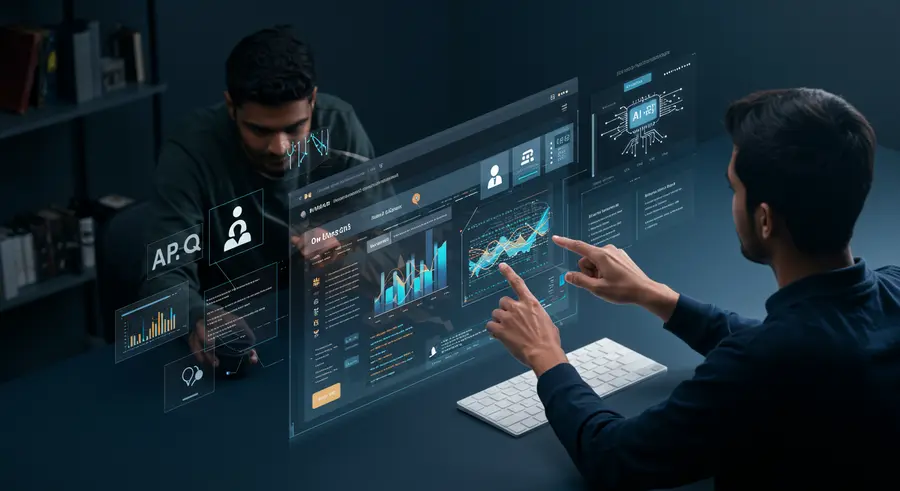Appearance

Welcome, tech innovators and digital pioneers! 👋 Today, we're diving deep into a topic that's not just a trend, but a transformative force reshaping the very fabric of the internet: Artificial Intelligence (AI) in Web Development. Forget the futuristic sci-fi; AI is here, now, making our web experiences smarter, more intuitive, and incredibly personalized. Let's explore how AI is moving beyond simple automation to truly revolutionize how we build and interact with websites.
Why AI in Web Development? 🤔
In an increasingly competitive digital landscape, user experience (UX) is king. Users expect seamless, highly relevant, and engaging interactions. This is where AI steps in, offering capabilities that traditional development alone can't match:
- Personalization at Scale: Imagine a website that knows what you need before you even search for it.
- Enhanced User Engagement: Dynamic content, intelligent chatbots, and adaptive interfaces keep users hooked.
- Streamlined Development: AI-powered tools assist developers, accelerating workflows and reducing manual errors.
- Predictive Capabilities: Anticipating user behavior to optimize flows and content.
Key Applications of AI in Web Development 🚀
Let's break down some of the most impactful ways AI is being integrated into web development, complete with real-world examples and practical insights.
1. Intelligent Chatbots & Virtual Assistants 💬
No longer just glorified FAQs, AI-powered chatbots are now sophisticated conversational interfaces. They handle customer inquiries, provide instant support, guide users through complex processes, and even complete transactions.
- Example: Many e-commerce sites use AI chatbots to help users find products, track orders, and resolve issues 24/7, significantly improving customer satisfaction and reducing support costs.
- Impact on UX: Instantaneous support, reduced frustration, and a feeling of being understood.
2. Hyper-Personalization and Content Recommendation Engines ✨
This is where AI truly shines in enhancing user experience. By analyzing user data (browsing history, preferences, demographics, interactions), AI algorithms can tailor content, product recommendations, and even entire user interfaces to individual users.
- Example: Netflix and Spotify are prime examples. Their AI-driven recommendation engines are so effective that they are a core part of their user retention strategy. On a website, this could mean showing different landing page content, product carousels, or blog articles based on a user's past behavior.
- Impact on UX: Highly relevant content, increased engagement, and a sense of a truly personalized journey.
3. AI-Powered Design and Development Tools 🛠️
AI is not just for end-users; it's empowering developers and designers too.
- Code Generation & Autocompletion: Tools like GitHub Copilot use AI to suggest code snippets, complete functions, and even generate entire blocks of code, speeding up development and reducing errors.
- UI/UX Design Automation: AI can analyze user behavior patterns to suggest optimal layouts, color schemes, and component placements. Some tools can even generate design mockups from text descriptions.
- Automated Testing: AI can identify potential bugs, generate test cases, and even perform automated UI tests, ensuring higher quality and faster release cycles.
- Impact on UX: Faster development means quicker delivery of new features and improvements, while AI-assisted design leads to more intuitive and user-friendly interfaces.
4. Predictive Analytics & User Behavior Analysis 📊
AI models can analyze vast amounts of user data to predict future behavior, identify trends, and uncover insights that inform design and development decisions.
- Example: Predicting churn risk, identifying conversion blockers, or understanding which features will be most popular. This allows businesses to proactively optimize their web applications.
- Impact on UX: Websites can adapt dynamically, anticipating user needs and providing a smoother, more efficient experience.
5. Enhanced Accessibility and Inclusivity 🌍
AI is making the web more accessible to everyone.
- Automated Alt-Text Generation: AI can describe images for visually impaired users.
- Real-time Language Translation: Breaking down language barriers.
- Voice User Interfaces (VUIs): Enabling hands-free interaction for users with motor impairments.
- Impact on UX: A more inclusive web, ensuring that everyone can access and interact with content effectively.
The Synergy with Progressive Web Apps (PWAs) 🤝
AI's power is amplified when combined with modern web technologies like Progressive Web Apps (PWAs). PWAs offer a native-app-like experience directly from the web browser, with features like offline access, push notifications, and fast loading times. When you integrate AI into a PWA, you get:
- Intelligent Offline Experiences: AI can pre-fetch content based on predicted user needs, making offline browsing even richer.
- Personalized Notifications: AI can determine the optimal time and content for push notifications, increasing their relevance and effectiveness.
- Adaptive Interfaces: PWAs can use AI to dynamically adjust their interface based on network conditions, device capabilities, and user preferences, offering a truly adaptive experience.
To learn more about the foundational power of PWAs, check out our article: The Power of Progressive Web Apps (PWAs).
Challenges and the Road Ahead 💪
While the potential of AI in web development is immense, there are challenges:
- Data Privacy: Ensuring responsible collection and use of user data.
- Ethical AI: Avoiding bias in algorithms and ensuring fairness.
- Complexity: Integrating AI can add layers of complexity to development and deployment.
However, as AI tools become more sophisticated and accessible, these challenges are being addressed. The future of web development is undoubtedly intertwined with AI, promising a web that is not just interactive, but intelligent, intuitive, and deeply personalized.
Conclusion 🎉
AI is no longer a niche technology; it's becoming an indispensable part of the web development toolkit. From automating mundane tasks to crafting deeply personalized user journeys, AI is pushing the boundaries of what's possible online. Embrace these advancements, experiment with AI-powered tools, and get ready to build the next generation of intelligent web experiences!
What are your thoughts on AI in web development? Share your insights in the comments below! 👇